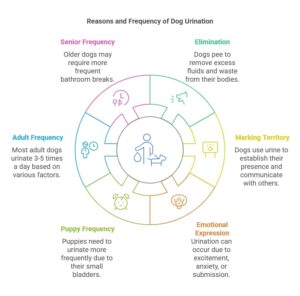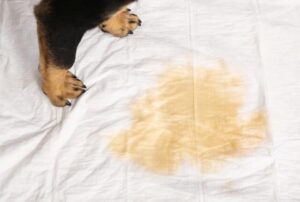Hypoallergenic dog food for puppies is designed to minimize allergic reactions. It typically contains limited ingredients and novel protein sources.
Puppies, like humans, can have food sensitivities that lead to skin irritations, digestive issues, and discomfort. Choosing hypoallergenic dog food helps address these concerns effectively. These specialized diets often use unique protein sources, such as duck or fish, and exclude common allergens like wheat and soy.
Owners should consult a veterinarian to identify specific allergies and select the best diet for their puppy's needs. A proper diet supports healthy growth, promotes a shiny coat, and enhances overall well-being. Understanding the ingredients and their benefits is crucial for making informed choices about your puppy's nutrition.

Royal Canin
Table of Contents
ToggleThe Need For Hypoallergenic Dog Food
Many puppies experience food allergies. Allergies can cause discomfort and health issues. Choosing the right food is vital for their growth. Hypoallergenic dog food offers a solution. It reduces the risk of allergic reactions.
Common Allergens In Puppy Diets
Identifying common allergens helps in selecting the right food. Here are typical allergens found in puppy diets:
| Allergen | Description |
|---|---|
| Beef | A common protein source that can cause allergies. |
| Dairy | Many puppies are lactose intolerant and develop reactions. |
| Chicken | Another popular protein that can trigger allergies. |
| Wheat | A grain that can lead to digestive issues in some puppies. |
| Eggs | May cause allergic reactions in sensitive puppies. |
Signs Your Puppy May Need A Hypoallergenic Option
Watch for signs that indicate your puppy may need special food. Common signs include:
- Itchy Skin: Excessive scratching can indicate allergies.
- Digestive Issues: Vomiting or diarrhea may occur.
- Ear Infections: Frequent ear problems can suggest allergies.
- Red or Inflamed Skin: Look for unusual redness or swelling.
- Food Refusal: Your puppy may avoid eating certain foods.
Observing these signs early is crucial. It helps in selecting appropriate hypoallergenic dog food.
Hypoallergenic Diet Benefits
Choosing a hypoallergenic diet for puppies offers numerous health benefits. These diets can help improve skin and coat health. They also support better digestion in sensitive pups. Understanding these benefits helps you make informed choices for your furry friend.
Improvements In Skin And Coat Health
Hypoallergenic dog food can dramatically enhance your puppy's skin and coat. Here are some key improvements:
- Reduced Allergies: Fewer allergens lead to less itching.
- Smoother Coat: A balanced diet promotes a shinier coat.
- Less Dander: This means a cleaner home for you.
- Hydration: Proper nutrition keeps skin moisturized.
Many dog owners notice a significant change in just weeks. A healthy coat reflects a healthy pup.
Digestive Advantages For Sensitive Pups
Hypoallergenic diets can greatly benefit puppies with sensitive stomachs. These diets often contain limited ingredients. This helps reduce digestive issues. Here are some advantages:
| Benefit | Description |
|---|---|
| Fewer Gastrointestinal Problems | Less vomiting and diarrhea in sensitive dogs. |
| Better Nutrient Absorption | High-quality ingredients aid in digesting nutrients. |
| Stable Energy Levels | Consistent digestion provides steady energy. |
By focusing on easy-to-digest ingredients, hypoallergenic diets promote better overall health. This makes your puppy happier and more active.
Key Ingredients To Look For
Choosing the right hypoallergenic dog food for your puppy is crucial. Focus on ingredients that promote health and reduce allergies. Here are key components to consider.
Alternative Proteins: Beyond Chicken And Beef
Many dogs are allergic to common proteins like chicken and beef. Explore different protein sources. Here are some excellent alternatives:
- Fish: Salmon and whitefish are rich in omega-3 fatty acids.
- Lamb: A great option for puppies with sensitive stomachs.
- Duck: Provides a unique flavor and essential nutrients.
- Rabbit: A lean protein that is gentle on the digestive system.
These alternative proteins help in minimizing allergic reactions. Always check for clear labeling on your dog food.
Carbohydrates That Reduce Allergic Reactions
Carbohydrates play an essential role in puppy diets. Some carbs can trigger allergies. Focus on hypoallergenic sources:
| Carbohydrate Source | Benefits |
|---|---|
| Sweet Potatoes | High in fiber and vitamins, easy to digest. |
| Brown Rice | Provides energy and is gentle on the stomach. |
| Quinoa | Gluten-free and packed with protein. |
| Peas | Rich in vitamins, minerals, and protein. |
These carbohydrate sources minimize allergic reactions. They offer vital nutrients for growth.
Avoiding Common Allergens
Choosing the right hypoallergenic dog food for puppies is crucial. Puppies can develop allergies easily. Identifying and avoiding common allergens helps maintain their health. This section covers key points to consider.
The Role Of Fillers In Dog Food Allergies
Fillers are ingredients that add bulk but little nutrition. Common fillers include:
- Corn
- Wheat
- Soy
These fillers can trigger allergic reactions in some puppies. Symptoms may include:
- Itchy skin
- Ear infections
- Digestive issues
Select dog food with high-quality ingredients. Look for options that minimize or eliminate fillers.
Reading Labels: Hidden Allergens To Watch Out For
Understanding dog food labels is vital. Many allergens hide in ingredients. Common hidden allergens include:
| Ingredient | Common Source |
|---|---|
| Beef | Beef meal, beef by-products |
| Chicken | Chicken meal, chicken by-products |
| Dairy | Whey, cheese |
Always check for these ingredients in your puppy’s food. Look for foods labeled as hypoallergenic. This choice reduces the risk of allergic reactions.
Top Hypoallergenic Dog Food Brands
Choosing the right hypoallergenic dog food for puppies is crucial. Puppies often face allergies to common ingredients. Selecting the right brand can help alleviate these issues. Below, we explore top brands that specialize in hypoallergenic food.
Brands With A Veterinary Formula
Veterinary formulas provide specialized nutrition for puppies with allergies. These brands often undergo rigorous testing and research.
- Hill's Prescription Diet
- Focuses on skin and food sensitivities.
- Contains high-quality ingredients.
Hill's Science Diet
- Royal Canin Veterinary Diet
- Tailored for specific health needs.
- Promotes healthy skin and coat.
Royal Canin
- Purina Pro Plan Veterinary Diets
- Features hydrolyzed protein formulas.
- Supports digestive health.
Purina Pro Plan
Organic And Natural Hypoallergenic Brands
Organic and natural brands focus on whole ingredients. They avoid artificial additives and fillers. This often helps reduce allergic reactions.
| Brand | Key Features |
|---|---|
| Blue Buffalo Basics | Limited ingredient diet for sensitive stomachs. |
| Wellness Simple | Natural ingredients, grain-free options. |
| Canidae Pure | High protein, limited ingredients. |
Blue Buffalo
Wellness CORE
Canidae PURE
These brands provide safe options for puppies with allergies. Always consult your vet before switching foods. Proper nutrition ensures a happy, healthy puppy.
Homemade Hypoallergenic Diets
Many pet owners choose homemade hypoallergenic diets for their puppies. These diets help prevent allergic reactions. They also provide fresh, high-quality ingredients. Making food at home gives you full control over what your puppy eats. This approach can support better health and well-being.
Creating A Balanced Diet At Home
Creating a balanced diet is crucial. Puppies need essential nutrients to grow strong. Here are some key components to include:
- Proteins: Lean meats like chicken or turkey.
- Carbohydrates: Brown rice or sweet potatoes.
- Fats: Fish oil or flaxseed oil for healthy skin.
- Vitamins and Minerals: Fresh vegetables like carrots or peas.
Follow these steps for a balanced meal:
- Choose a protein source.
- Add a carbohydrate.
- Include healthy fats.
- Mix in vegetables.
Ensure you measure ingredients correctly. This helps maintain proper nutrition levels. A table can help track your ingredients:
| Ingredient | Recommended Amount |
|---|---|
| Lean Protein | 40% of the meal |
| Carbohydrates | 50% of the meal |
| Fats | 10% of the meal |
Consulting With A Vet Before Going Homemade
Always consult a veterinarian before changing your puppy's diet. They provide valuable guidance. A vet can ensure your puppy receives all necessary nutrients. Regular check-ups can help monitor your puppy’s health.
Ask your vet these questions:
- What ingredients are safe for my puppy?
- How can I balance the diet?
- What supplements may be needed?
Following expert advice ensures a safe and healthy diet. Homemade diets can be beneficial with proper planning.
Transitioning To Hypoallergenic Food
Switching your puppy to hypoallergenic food requires care. A gradual transition helps their stomach adjust. This process reduces the risk of digestive upset. Follow these steps for a smooth change.
Introducing New Food Gradually
Start by mixing the new food with the old food. This method helps your puppy adapt easily. Follow this simple guideline:
- Day 1-2: 25% new food, 75% old food
- Day 3-4: 50% new food, 50% old food
- Day 5-6: 75% new food, 25% old food
- Day 7: 100% new food
Watch your puppy during this transition. If they show any signs of discomfort, slow down. Adjust the mix as needed.
Monitoring Your Puppy’s Reaction To The New Diet
Observe your puppy closely after each meal. Look for these signs:
- Normal stools
- Healthy coat
- Energy levels
- Skin condition
Check for any adverse reactions, like:
- Vomiting
- Diarrhea
- Excessive scratching
If you notice any issues, consult your vet. They can suggest the best course of action. Transitioning to hypoallergenic food requires patience. Your puppy's health is worth the effort.

Additional Care For Allergy-prone Puppies
Caring for puppies with allergies requires special attention. Proper diet and care can improve their quality of life. Understanding how to manage allergies is essential for their health.
Regular Veterinary Check-ups
Regular visits to the vet are crucial for allergy-prone puppies. These check-ups help monitor your puppy’s health. A veterinarian can spot early signs of allergies. Here are key points to remember:
- Schedule check-ups every 6 months.
- Discuss any changes in behavior or health.
- Keep vaccinations up to date.
During these visits, the vet may suggest:
- Skin tests for allergens.
- Blood tests for food sensitivities.
- Consultations with pet nutritionists.
Allergy Testing For A Targeted Diet
Identifying specific allergens can help tailor your puppy's diet. Allergy testing allows for a more effective approach to nutrition. Options include:
- Skin tests: Quick and often reliable.
- Blood tests: Measures the immune response.
- Elimination diets: Gradually introduce foods to find triggers.
A targeted diet can include:
| Protein Sources | Grain Options | Vegetable Additions |
|---|---|---|
| Chicken | Brown rice | Carrots |
| Fish | Quinoa | Sweet potatoes |
| Turkey | Oats | Green beans |
Keep a food diary. Track what your puppy eats and any reactions. This helps in adjusting their diet effectively.
:strip_icc()/Spruce-best-dog-food-for-allergies-4173781-024027f06d344cd8acf7267d38694fa3.jpg)
Frequently Asked Questions About Hypoallergenic Dog Food for Puppies
What Is Hypoallergenic Dog Food For Puppies?
Hypoallergenic dog food for puppies is specially formulated to reduce allergic reactions. It typically contains limited ingredients and avoids common allergens like wheat, soy, and dairy. This type of food helps support healthy growth while minimizing digestive issues or skin irritations in sensitive puppies.
How To Choose The Best Hypoallergenic Puppy Food?
To choose the best hypoallergenic puppy food, look for high-quality ingredients. Avoid foods with fillers or artificial additives. Check for a single protein source, such as lamb or fish. Consulting with your veterinarian can also help identify the most suitable options for your puppy's specific needs.
Are There Benefits To Hypoallergenic Puppy Food?
Yes, hypoallergenic puppy food can help prevent allergic reactions. It supports better digestion and improves skin health. Puppies often experience fewer gastrointestinal issues, leading to overall better health. Additionally, it can contribute to a shinier coat and more energy, enhancing your puppy's quality of life.
Can All Puppies Eat Hypoallergenic Food?
Not all puppies need hypoallergenic food. It’s typically recommended for those with allergies or sensitivities. If your puppy shows signs of discomfort, such as itching or digestive problems, consult your veterinarian. They can determine if a hypoallergenic diet is suitable for your puppy's specific health needs.
Conclusion
Choosing hypoallergenic dog food for puppies is essential for their health and well-being. It helps prevent allergic reactions and supports their growth. Always consult with your veterinarian to find the best option. A balanced diet will set the foundation for a happy, healthy life for your furry friend.
Prioritize their nutrition today!














